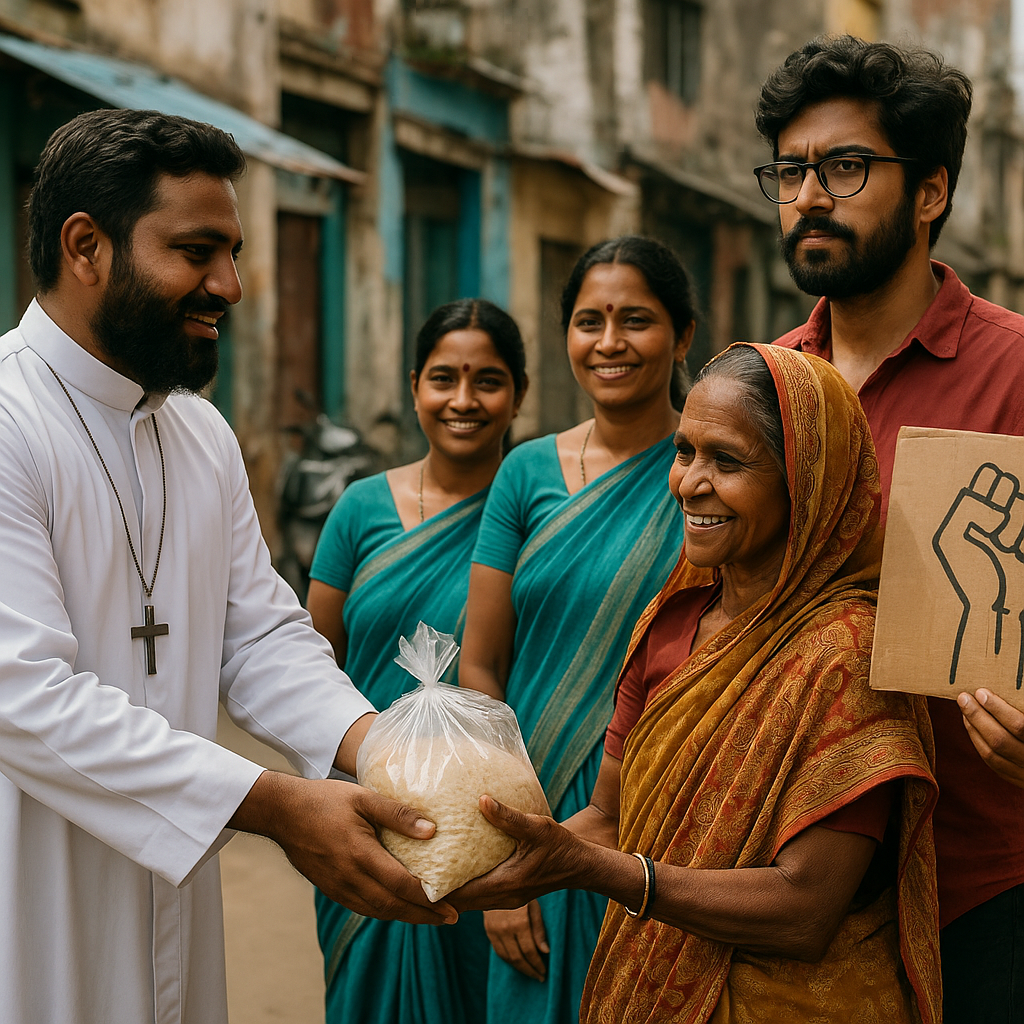Faith-Based Activism: From Humanitarian Aid to Social Justice in India
Faith and activism have long walked hand in hand in India. From the teachings of Buddha and Nanak to the movements led by Gandhi and Ambedkar, religion has often served as both a moral compass and a mobilizing force for justice. In today’s India, faith-based activism continues to evolve — no longer limited to charity or ritual service but expanding into fields like education, healthcare, climate action, and human rights. Across religions, spiritual organizations and young believers are translating faith into action, blending compassion with civic responsibility in new and inspiring ways.
The Roots of Faith in Service
India’s history of religious service (seva, zakat, kar seva, daan) has always emphasized helping others as an expression of devotion. Hindu temples, Sikh gurdwaras, churches, and mosques have long provided food, shelter, and care to the needy. These traditions created a moral foundation for organized humanitarian work that transcends faith boundaries.
The Sikh tradition of langar, for instance, offers free meals to anyone regardless of caste, religion, or background — a centuries-old example of equality in practice. Similarly, Islamic organizations continue to channel zakat (obligatory charity) toward orphan care, education, and disaster relief. Christian missions have contributed deeply to health and education in rural areas, while Buddhist and Jain groups work to promote nonviolence and compassion toward all living beings.
This spiritual commitment to service forms the backbone of India’s modern faith-based activism — where moral conviction becomes social action.
From Charity to Change: The New Activism
Earlier, religious service was often focused on direct relief — feeding the hungry, running schools, or supporting widows and orphans. But today’s faith-based activists are taking a broader view. They see structural injustice — poverty, caste discrimination, gender inequality, environmental destruction — as moral issues that require systemic change, not just charity.
For example, several Hindu and interfaith NGOs now work on rural development, women’s rights, and digital literacy inspired by sarva dharma sambhava (respect for all faiths). Sikh groups like Khalsa Aid combine spirituality with disaster response, providing relief in floods, earthquakes, and wars across the globe. Muslim charities such as Human Welfare Foundation and Zakat Center India are using modern management tools to make charity more transparent and impactful.
Meanwhile, Christian and Buddhist networks emphasize peacebuilding, community health, and environmental sustainability. This evolution marks a shift — from “helping the poor” to “empowering communities,” from individual compassion to collective justice.
Faith in Times of Crisis
India’s faith-based groups have repeatedly stepped forward in moments of national crisis. During the Covid-19 pandemic, religious organizations became the first responders when government systems were stretched thin. Gurdwaras provided oxygen and food to thousands, temples opened halls for quarantine centers, mosques distributed meals to migrant workers, and churches organized community kitchens.
These acts of compassion were not merely religious duties; they were expressions of national solidarity rooted in faith. They also demonstrated how spiritual institutions can mobilize vast networks quickly — cutting across bureaucracy and political divides to deliver help where it’s needed most.
Even in natural disasters like the Kerala floods or the Odisha cyclone, interfaith collaborations have become more common. Hindu priests, Muslim clerics, and Christian pastors often work side by side, showing that humanitarianism can transcend sectarian lines when guided by shared moral values.
Faith and the Fight for Social Justice
Beyond relief work, faith-based activism in India is increasingly linked to social reform and justice. Religious teachings are being reinterpreted to address issues like caste discrimination, gender inequality, and environmental degradation.
Dalit Christian and Buddhist movements, for example, draw strength from spiritual narratives of liberation and equality. Hindu reform organizations inspired by figures like Swami Vivekananda and Dayananda Saraswati continue to challenge superstition and promote education as a sacred duty. Muslim reformers highlight adl (justice) and rahma (compassion) as guiding principles for modern social change. Sikh groups, guided by sarbat da bhala (welfare of all), campaign for farmers’ rights and equitable access to resources.
Such activism reveals that faith, when directed toward justice rather than domination, can become a transformative social power.
The Role of Youth and Technology
A new generation of believers is bringing faith-based activism into the digital age. Social media campaigns, crowdfunding platforms, and volunteer networks are now central to religious humanitarianism. Young Indians use their faith identity to promote inclusivity and solidarity — organizing blood drives during Ramzan, planting trees on Guru Nanak Jayanti, or distributing menstrual hygiene kits as part of temple-based charity.
Interfaith youth networks such as Youth for Peace or Project Milaap are building bridges between communities through service. These initiatives signal a vital shift — where religion is no longer about separation, but shared responsibility.
Technology has also helped make charity more accountable. Apps that track donations, map relief work, or connect volunteers are changing how faith organizations operate, making them more transparent and professional while retaining their spiritual essence.
Challenges and Ethical Boundaries
Despite its promise, faith-based activism faces challenges. Some critics argue that religious organizations sometimes mix service with proselytization or political influence. Balancing faith identity with inclusivity remains a delicate task. There is also the question of accountability — ensuring funds and efforts genuinely serve all communities, not just co-religionists.
Yet, many organizations are consciously adopting non-discriminatory approaches, aligning their work with constitutional values and human rights frameworks. This ethical evolution is helping reframe religion’s public role — from dominance to dialogue, from charity to empowerment. Faith-based activism in India is undergoing a profound transformation. Rooted in ancient traditions of service, it is now engaging with contemporary issues of justice, sustainability, and equality. Whether through temple kitchens feeding the hungry, mosques providing flood relief, churches running hospitals, or interfaith youth groups championing climate action — religion remains a force of compassion and conscience.
In an age often marked by division, these movements remind India of a timeless truth: that spirituality finds its highest expression not in ritual, but in service to others. Faith, when turned outward in the spirit of justice, becomes not just a belief system — but a movement for humanity itself.
~Religion World Bureau










